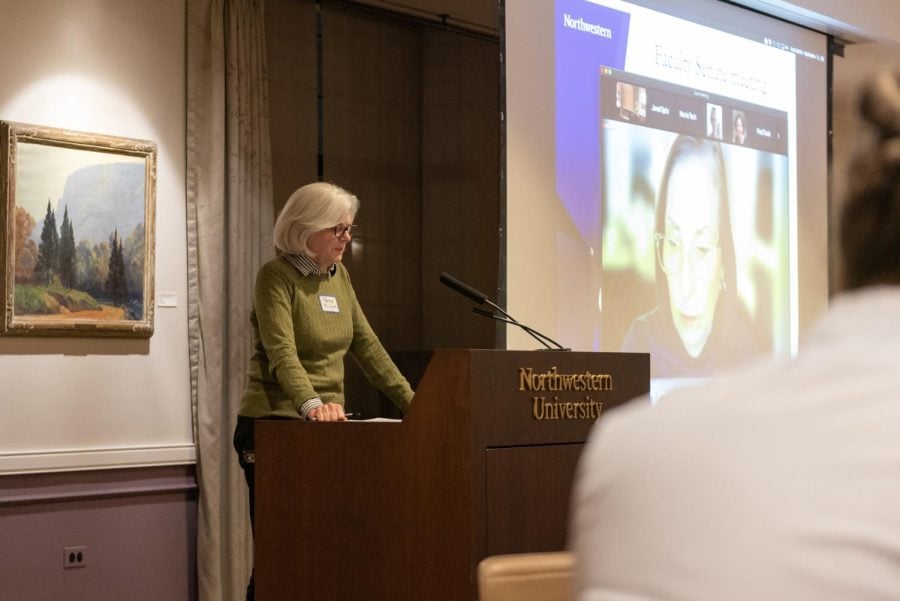Lorraine Goffe discusses staffing retention problems, possible solutions at Faculty Senate
Esther Lim/The Daily Northwestern
Kellogg Prof. Therese McGuire speaks at Faculty Senate in the Guild Lounge on Wednesday. Vice President for Human Resources Lorraine Goffe said the University is making improvements in staff hiring.
November 10, 2022
Lorraine Goffe, Northwestern’s vice president for human resources, outlined potential solutions to University staff retention problems at Wednesday’s Faculty Senate meeting.
Several hundred people filled out NU’s former employee survey, which was sent in March to employees who had left their position in the last 12 months to understand their reasoning. Goffe said the response rate was “very high” — at 34%.
“We know in general why people have been leaving their employers,” Goffe said, “But I wanted to make sure we understood if those were the same reasons why people here at Northwestern were leaving.”
Goffe said the survey revealed employees left the University because of five main factors. Most significantly, employees ranked salary as a consideration, followed by quality of direct supervisor, lack of career advancement opportunities, perceived lack of flexibility and job-related stress. Working on these findings has helped NU fill 73 positions since April. As of October, the University has 645 openings.
To continue addressing the gap, Goffe said NU plans to create a brand new job architecture that resembles traditional organizational hierarchies.
“More defined job architecture will help us ensure that we are aligned with (the) market (and) that we are being consistent with our compensation philosophy,” Goffe said. “It will be a very, very large project, but when done, it can be beneficial for Northwestern for many years to come.”
Goffe said the University has also taken specific measures to address salary issues. Staff who left said NU did not do enough to address its retirement pause and were unhappy with the zero annual merit increase in salary.
In September, NU provided merit increases, which was a pool of about 4%. An additional 1% was available to help with equity issues. But some faculty members, like economics Prof. Mark Witte, expressed frustrations with these raises.
“The merit raises, certainly appreciate it, but it’s a little bit galling in terms of what it costs to us to get to campus … in real terms, we’re worse off than we were,” Witte said. “It’s actually something of a merit cut for what we’re doing for the University.”
Witte then asked a question on behalf of staff members who wanted more flexibility to be promoted within roles. Goffe previously said the University was working on creating clear career paths for staff so they would stay motivated to keep working at NU.
Feinberg Prof. Sara Solla said she enjoyed Goffe’s presentation and agreed on the importance of compensation and benefits. She added that workplace culture makes many staff at NU feel underappreciated, which could contribute to retention issues.
“As you tackle certain practical problems that you mentioned where you can be quantitative and try to do better in a quantitative manner, there is also this aspect, which is not so easy to quantify but is still important, which is to work towards a culture where the staff feels appreciated and feels part of (the) enterprise,” Solla said.
Email: [email protected]
Twitter: @joannah_11
Related Stories:
— University President Schill, NU administrators discuss Ryan Field redesign at Faculty Senate


